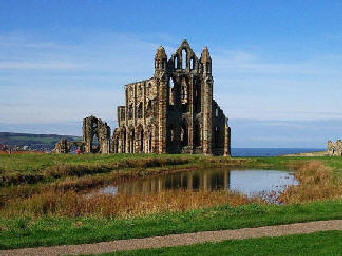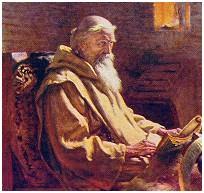Families and Elder Care in the Twenty-first Century, Ann Bookman and Delia Kimbrel
Our green and pleasant country has played host to many notable wordsmiths through the centuries. Names similar Shakespeare, Chaucer, Wordsworth and Keats automatically spring to mind when nosotros talk about English language poetry. But how did this proud tradition brainstorm and who was the 'first' English language poet? Maybe surprisingly, the earliest recorded poem in Old English has very humble origins and is credited to a shy and retiring cowherd named Caedmon.
Although Caedmon has been referred to many times in medieval literature, it is the 'Father of English History', the Venerable Bede (672 – 26 May 735 Advertisement) who outset refers to Cademon in his seminal work of 731AD, Historia ecclesiastica gentis Anglorum (The Ecclesiastical History of the English People). Co-ordinate to Bede, Caedmon tended to the animals which belonged to the Northumbrian monastery of Streonæshalch (later to become Whitby Abbey) during St Hilda's time as Abbess between 657– 680AD.

Whitby Abbey, photo © Suzanne Kirkhope, Wonderful Whitby
Equally legend would have it, Caedmon was unable to sing and knew no poetry, quietly parting the mead hall whenever the harp was passed around so that he would not embarrass himself in front of his more literate peers. On 1 such evening as he fell asleep amongst the animals in his care, Caedmon is said to have dreamt that an apparition appeared before him telling him to sing of the principium creaturarum, or 'the beginning of created things'. Miraculously, Caedmon all of a sudden began to sing and the memory of the dream stayed with him, assuasive him to recall the holy verses for his master, Hilda and members of her inner circle.
When Caedmon was able to produce more religious poetry it was decided that the gift was a approval from God. He went on to take his vows and become a monk, learning his scriptures and the history of Christianity from Hilda's scholars and producing beautiful poetry as he did and so.
Caedmon remained a devout follower of the Church for the rest of his life and although never formally recognised every bit a saint, Bede notes that Caedmon was granted a premonition of his death post-obit a short illness – an award usually reserved for the most holy of God's followers – allowing him to receive the Eucharist ane last fourth dimension and to arrange for his friends to be with him.
Unfortunately all that remains of Caedmon's verse today is the nine line poem known equally Cædmon's Hymn, which Bede includes in his Historia ecclesiastica and is said to be the poem that Caedmon outset sang in his dream. Interestingly, Bede chose not to include the Erstwhile English version of Cædmon'due south Hymn in his original version of the Historia ecclesiastica, but instead the Hymn was written in Latin, presumably to appeal to a earth-wide audition who would be unfamiliar with the Anglo-Saxon linguistic communication. The Hymn appears in Former English in subsequent versions of the Historia ecclesiastica which were translated by the Anglo-Saxons from the 8 century onwards.

The Venerable Bede talks about Caedmon in Historia Ecclesiastica Iv. 24: Quod in monasterio eius fuerit frater, cui donum canendi sit divinitus concessum – 'How in this monastery at that place was a brother, to whom the gift of song was divinely given'.
The endless translations and amendments to Bede's Historia ecclesiastica over the years mean that we cannot know the original words of Caedmon's Hymn with any certainty, peculiarly every bit many of the Old English versions would accept been a directly translation from Bede's Latin – so in issue a translation of a translation. Bede also offers no specific dates for the Hymn, save to say that Caedmon lived at the Streonæshalch monastery during Hilda's time as Abbess and that Caedmon died around the time of a cracking fire at Coldingham Abbey, said to have taken place between 679 – 681AD.
Although originally equanimous to be sung aloud in praise of God, the class and construction of Caedmon's 'Hymn' is actually more than akin to a poem than a hymn in the tradition sense. The Hymn is also heavily alliterated and contains a intermission mid line, a style favoured by Quondam English language poetry which was itself the result of the oral traditions existence designed to exist read, rather than spoken or sung.
The fanciful nature of Caedmon'south inspiration for the Hymn has led many historians to doubt the authenticity of Bede'south story. The traditional Anglo-Saxon poesy reserved for the worship of monarchs has also been adapted from the original 'rices weard' (keeper of the kingdom) to 'heofonrices weard' (keeper of the kingdom of heaven) in Caedmon'south Hymn, suggesting a less divine inspiration. Yet, whilst information technology is unlikely that Caedmon's Hymn was the very beginning poem to exist composed in Old English, it certainly takes its place in history as the earliest surviving poetry of its kind, quite apart from its supposedly miraculous inception.
Caedmon'southward Hymn in Old English language and its modern translation (extract from The Earliest English Poems, Tertiary Edition, Penguin Books, 1991):
'Nu sculon herigean heofonrices Weard,
Meotodes meahte ond his modgeþanc,
weorc Wuldorfæder; swa he wundra gehwæs
ece Drihten, or onstealde.
He ærest sceop eorðan bearnum
heofon to hrofe, halig Scyppend:
þa middangeard moncynnes Weard,
ece Drihten, æfter teode
firum foldan, Frea ælmihtig.'
Praise now to the keeper of the kingdom of heaven,
the power of the Creator, the profound mind
of the glorious Male parent, who fashioned the beginning
of every wonder, the eternal Lord.
For the children of men he made showtime
heaven every bit a roof, the holy Creator.
And so the Lord of mankind, the everlasting Shepherd,
ordained in the midst equally a dwelling place,
Almighty Lord, the globe for men.
Source: https://www.historic-uk.com/HistoryUK/HistoryofEngland/Caedmon-the-first-English-poet/
0 Response to "Families and Elder Care in the Twenty-first Century, Ann Bookman and Delia Kimbrel"
Post a Comment